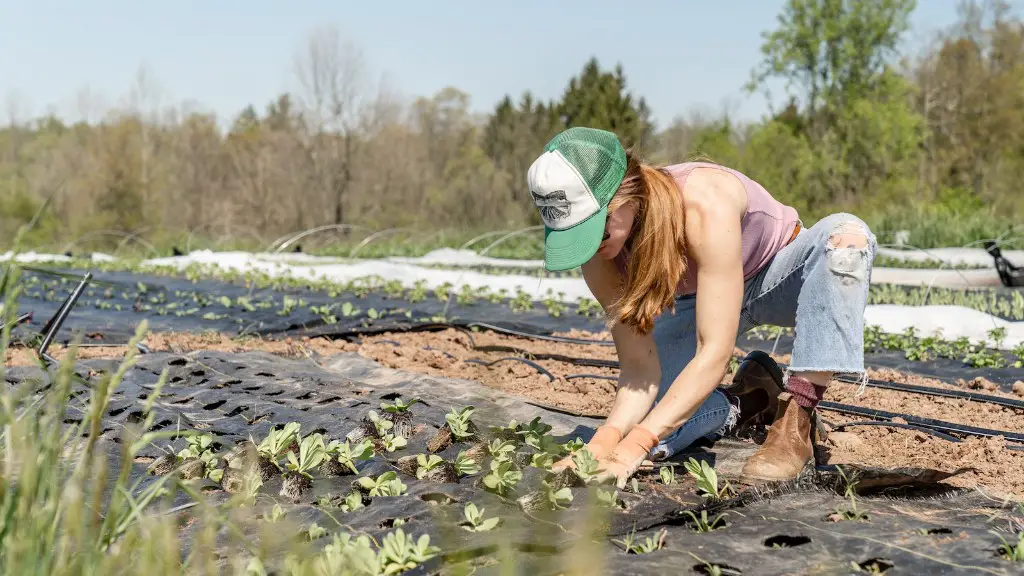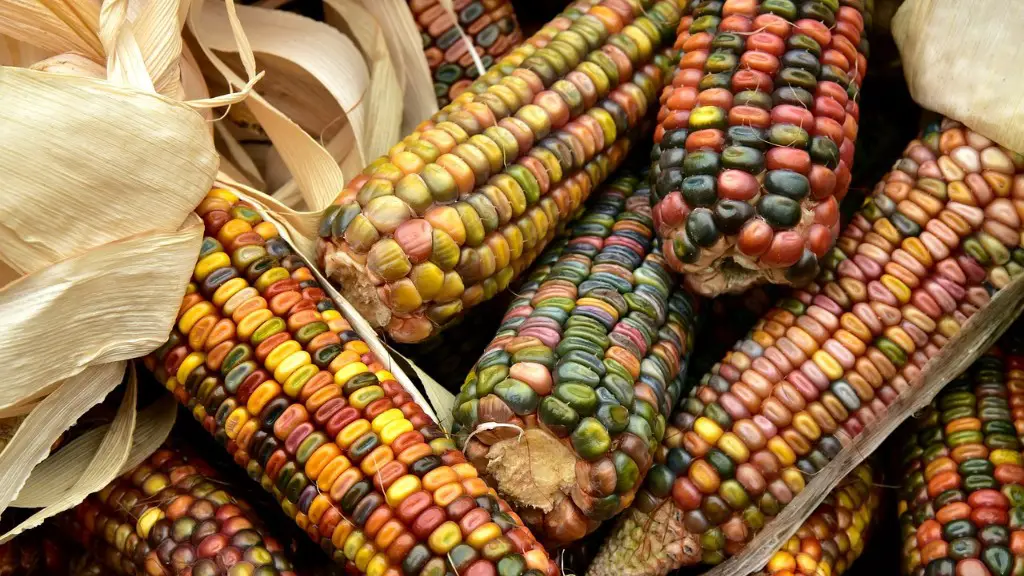Microbes play a vital role in agriculture, and their importance is only growing as the problems posed by a changing climate and global population become more pronounced. Microbes are beneficial for crop growth and soil health, and can increase crop yields, control plant diseases, and reduce the need for chemical inputs. Here, we explore how microbes help in agriculture.
Microbes are key players in the nitrogen cycle, which is essential for the growth of plants and other vegetation. Nitrogen-fixing bacteria in soil can convert atmospheric nitrogen into a usable form that plants can access, thus providing an essential nutrient. Similarly, mycorrhizal fungi colonize plant root systems, allowing plants to access additional nutrients, such as phosphorus and sulfur, and protect plants from soil-borne pathogens.
In addition, microbes also play an important role in pest and weed management. Certain bacteria and fungi produce bacterial toxins, which can act as a natural insecticide. Microbes can also be introduced to infested crops to prevent or reduce crop infestation. Microbes are also used as biological control agents, competing with weed seeds for nutrients, thus reducing the need for chemical herbicides and pesticides.
Furthermore, microbes can aid in water management. By increasing the porosity of soil, they can allow water to penetrate deeper and more quickly, thus improving soil drainage and making it easier for plants to access the water and nutrients they need. Additionally, the presence of beneficial microbes can lessen the impacts of salinity, allowing salt-tolerant crops to be grown in otherwise hostile environments.
Finally, microbes also play a role in soil health. Microbial biomass in soil acts as a natural fertilizer and contributes to soil structure, enabling it to better retain both water and nutrients. Microbes also stimulate soil organic matter, which is important for improved soil health and increases crop productivity.
How Fungi Help in Agriculture
Fungi are important for crop production and soil health. Fungi are known to improve the availability of nutrients, such as phosphorous, to plants, and also help to suppress soil diseases and pests. They can also produce antifungal compounds that can act as a natural pesticide and deter fungi from attacking the plants. Additionally, fungi are important for soil fertility, as they contribute to the formation of organic matter and can make soil more porous, thus allowing water and air to penetrate deeper and more quickly.
Fungi can also help make degraded land usable again. Fungi can decompose organic matter and make it available to plants as a nutrient source, thus improving soil fertility. Fungal mycelia can form vast underground networks that can bind particles together, improving soil stability and preventing soil erosion.
Fungi are also important for plant growth and development. Fungi form symbiotic relationships with plants, exchanging nutrients and hormone-like molecules which can promote plant growth. Additionally, some fungi can increase the uptake of certain nutrients like nitrogen, copper, zinc and iron, increasing the availability of these essential elements for the plants.
Furthermore, some fungi are also beneficial for seed germination and early seedling growth. For example, some fungal spores can bind to the seed prior to germination, increasing seedling emergence and improving crop yields. Fungi can also help to suppress root-knot nematode populations, thus reducing crop losses and damage.
Finally, fungi also play an important role in carbon storage. Fungi are able to break down complex compounds, like lignin, which is a major component of plant biomass. This process known as lignocellulose degradation releases carbon dioxide, which is then stored in the soil, thus helping to reduce carbon dioxide emissions and mitigate climate change.
How Bacteria Help in Agriculture
Bacteria are also important in agriculture, playing a role in several aspects of crop production. Bacteria are essential for nitrogen fixation, which is necessary for plant growth, and can also increase the availability of other essential nutrients like carbon and sulfur. Additionally, bacteria can help to protect plants from pathogens, either by competing with them for nutrients or by producing antibiotic compounds.
Bacteria are also important for improving soil fertility. By decomposing organic matter, bacteria can make nutrients, such as nitrogen and phosphorous, available to plants. Additionally, certain bacteria, such as soil-dwelling Bacillus species, are known to produce plant growth-promoting compounds, which can increase crop yields.
Bacteria are also beneficial for water management. They can increase the porosity of soils, thus improving water infiltration and drainage. This can be important for regions where water is scarce, as it can decrease water loss and increase water availability to plants.
Bacteria are also beneficial for soil carbon storage. Through the process of respiration, bacteria can take up large amounts of carbon dioxide and store it in the soil, thus helping to reduce atmospheric levels of the greenhouse gas.
Finally, bacteria can also be used as biocontrol agents. Certain bacteria produce compounds which can control pests, weeds and pathogens, thus reducing the need for chemical inputs. Additionally, they can also act as natural insecticides and repellents, thus providing an alternative to chemical inputs.
How Algae Help in Agriculture
Algae are also beneficial for agriculture, playing an important role in crop production and soil health. Algae are able to convert atmospheric nitrogen into a usable form that plants can access, thus providing an essential nutrient. They can also help to improve the availability of phosphorus and other essential nutrients, increasing crop yields and productivity.
Algae are also beneficial for weed management. By competing with weeds for nutrients, they can reduce the need for chemical herbicides and pesticides. Additionally, certain species of algae are known to produce antibiotic compounds, which can help to control soils-borne pathogens.
Algae can also help to improve soil structure. Certain species of algae are known to form complex and extensive networks, which can bind particles together and increase the water-retention capacity of soils. This can be beneficial for farmers in areas where water is scarce, as it can help to reduce the amount of water lost through drainage.
Finally, algae can also help with carbon sequestration and storage. Through the process of photosynthesis, they can absorb large amounts of carbon dioxide and store it in the form of biomass. This can help to reduce atmospheric levels of carbon dioxide, thus mitigating the impacts of climate change.
How Archaea Help in Agriculture
Archaea are also essential for agricultural production and soil health. They can increase the availability of essential nutrients to plants, including nitrogen, phosphorus and other micronutrients. Additionally, they are also known to produce antibiotics, which can act as a natural insecticide and help to control crop pests and diseases.
Archaea can also be beneficial for water management. By increasing the porosity of soil, they can allow water to penetrate deeper and more quickly, thus improving drainage and reducing the amount of water lost through evaporation. This can be especially important for areas where water is scarce, as it can make the water more accessible to plants.
Archaea can also help to improve soil fertility. By decomposing organic matter, they can make it available to plants as a nutrient source. In addition, certain species of archaea are known to produce plant growth-promoting compounds, which can increase crop yields.
Finally, archaea can also help with carbon sequestration and storage. Through the process of respiration, archaea can take up large amounts of carbon dioxide and store it in the soil. This can help to reduce atmospheric levels of carbon dioxide, thus mitigating the impacts of climate change.





